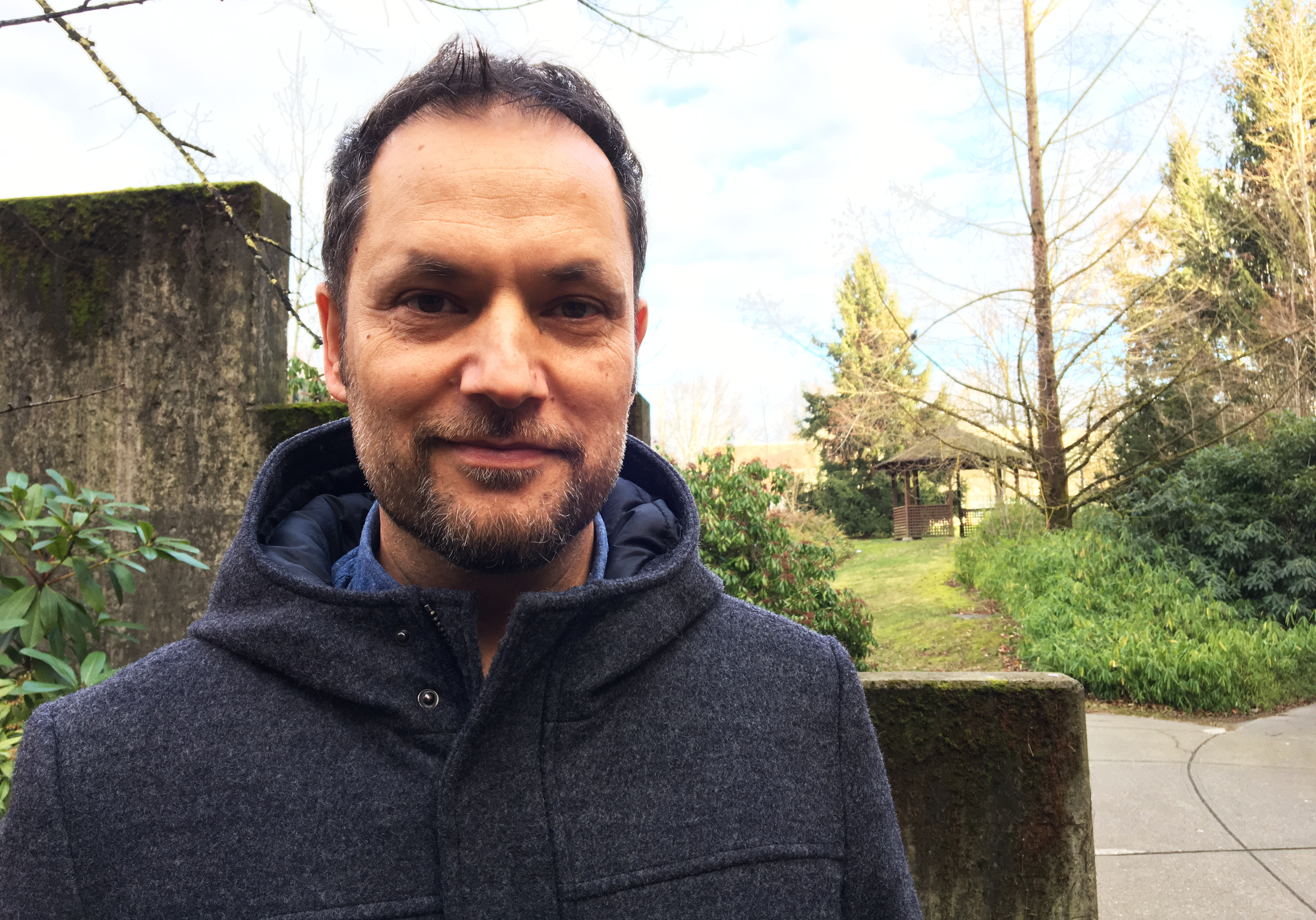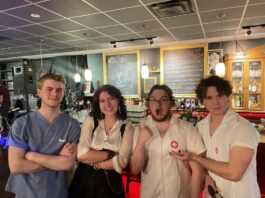By Jessica Barclay & Mikaela Collins
Alex Ferguson is an actor, director, and teacher of art and theatre, and holds a PhD from UBC in sonography and neuroscience. He is currently the artistic director of a performance company in Vancouver called Fight With a Stick, where his work focuses on transdisciplinary performances.
In addition to his work as a director, Alex has been teaching for eight years in a variety of areas, from performance theory to theatre history to acting. Along the way he’s taken the opportunity to teach himself architecture, musical composition, contemporary dance, theatre, posttraumatic theatre, performance art, installation art, and the history of theatre. Most recently, Alex came to UFV as a theatre teacher, and is directing the theatre department’s winter mainstage Attempts on her Life.
How has your family background influenced your work?
I come from an immigrant family, a Greek family. I have a Scottish last name, but it’s a freak of history. I’m actually 100 per cent Greek on both sides. That’s kind of shaped a lot of the way I write plays, it’s shaped a lot of the way I think. Just the sense of humour, the emotional landscape of my Greek family, all that stuff’s really fed into how I think and how I make work.
It’s hard to describe your sense of humour because humour is always hard to describe that way. I don’t want to generalize about Greek culture or anything like that, but it’s interesting, I think there’s less of a sense that realism equals truth.
I think my humour tends to be more absurdist, a little bit surrealistic. I have no reservations about mixing genres in the same play; in fact, I do it deliberately. I’ll put a very realist scene next to a very absurd scene next to a kind of philosophical diatribe next to a stretch of poetry. And for me, the multiplicity enriches the experience. For some people, not so much.
You went back to school after being a professional artist for many years. What did you study?
I got a PhD in scenography and neuroscience. So, studying how people come to understand on an embodied level or somatic level: space, distances, spatial configurations, all that kind of stuff. It has to do with theatre spaces, theatre compositions. But of course it applies to anything.
How do these two areas intersect?
So part of cognitive neuroscience is showing on a neuromuscular level, including your brain, how one idea is simulation. Everything you see isn’t just a thing happening out there. It’s something that you’re actually doing in your body. So, you’re simulating on a neuromuscular level everything you see and that’s why it makes sense to you. Take the theatre for example: if somebody is walking across the stage and their body is tense and they’re moving quickly, part of you is tense and moving quickly and that’s how you understand that they’re tense and moving quickly.
I think also over life you develop a repertoire of movement that makes sense to you, and this is neurologically implanted in your brain and your body. So one thing that might happen to you is somebody will dance on stage and you’ll really like it because you have that inside you. And then somebody may do something that you don’t have inside you and either you’ll update your neuropatterns to create a pattern for it, or if there’s no connection at all you probably won’t.
Do you use these ideas in your productions?
What I do is if I’m composing something onstage, because I like to play with what is familiar and not familiar, but with the not familiar it’s like how do you bridge between the two? How do you make the unfamiliar familiar enough? The most interesting thing for me in theatre is when you don’t know what’s happening but you’re interested; when it’s been well-constructed and you don’t know what’s going on but you just can’t help being intrigued with what’s going on. That’s for me the best.
I think that what’s happening at that point is you’ve got just enough understanding but not enough to go, “Oh yeah, I know what it is.” And so that keeps you in a state of openness to it. You remain open. Now that’s a great state because then you’re kind of awake; now you’re really awake, now you’re really there, now you’re really investigating, and I don’t mean necessarily intellectual. I mean on a kind of a gut level, emotional, psychophysical sort of level.
I do a lot of work where I’m messing with what is familiar. So sometimes, maybe I’ll look at a suitcase. Can that carry a story? Can it carry any meaning by itself? I mean without anything else, only the colour and the texture… Maybe. So, I’ll mess with that and see, and sometimes wonderful things will happen.
Image: Mikaela Collins/The Cascade




